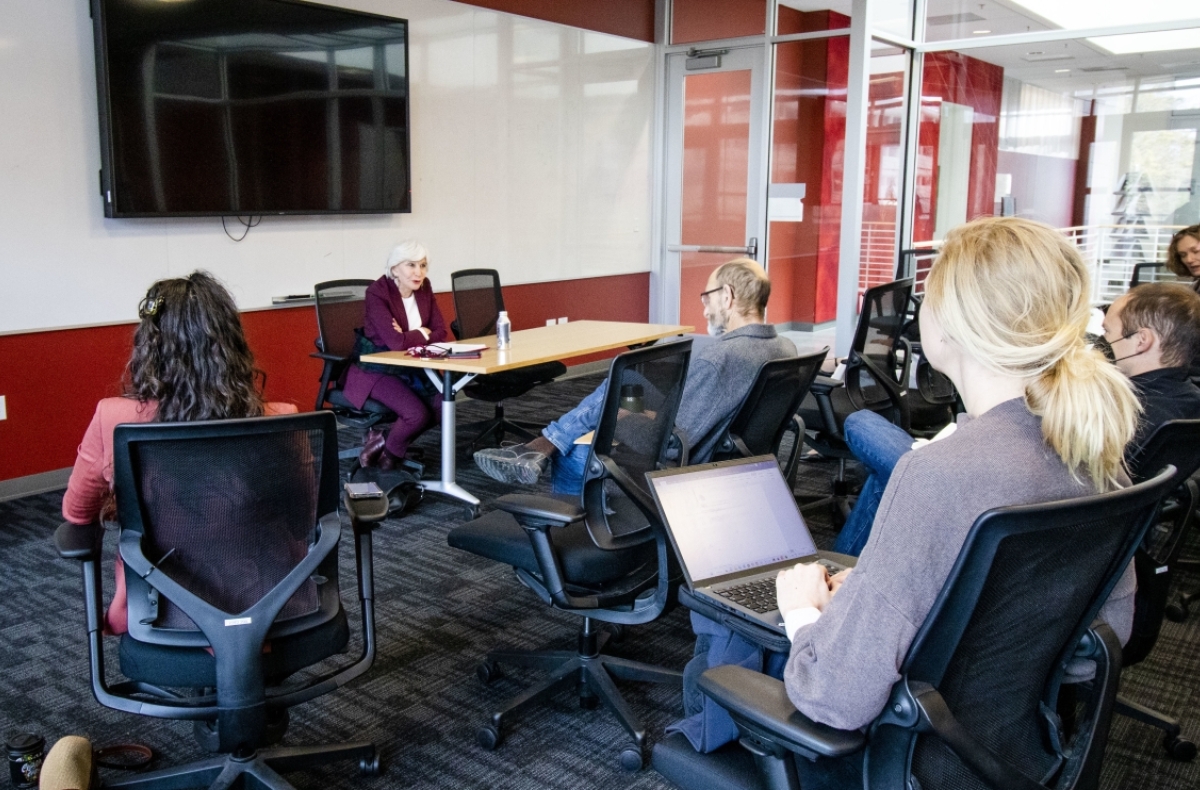The Woods Institute is now part of the Stanford Doerr School of Sustainability
CEO of European Climate Foundation speaks on Global Energy Transition, Geopolitics, & Security

Madison Pobis
According to the International Energy Agency’s latest analysis, global carbon dioxide (CO2) emissions reached a record high in 2022. Emissions plateaued in China, increased in the US, and dropped by 2.5% in Europe.
What will it take for the world to collectively reduce our emissions and stave off the worst consequences of climate change? In an Environmental Forum at the Stanford Woods Institute for the Environment, Laurence Tubiana, CEO of the European Climate Foundation and a key player in the development of the Paris Agreement, broke down where Europe currently stands in the global energy transition - and where hope can be found for a cleaner future.
“We see fragmentation of the global order to various hegemonic centers of gravity, (and) we can’t do decarbonization in a totally fragmented way.”
The war in Ukraine has led to fragmentation and the deprioritization of climate diplomacy in Europe. We have seen the weaponization of oil and gas as fossil fuel exporters make enormous profits, and a new geopolitics where Europe focuses on independence from oil and gas suppliers. Tubiana noted that tension continues to build between maintaining an accelerated transition to renewables and continuing to subsidize fossil fuel.
Europe is further plagued by high levels of inflation, supply chain challenges, and growing inequality. Europe’s dependence on the Chinese supply chain raises further questions of how to balance cooperation with competition. As climate change persists, these crises will likely continue to play a role in the further fragmentation of the world.
“Attention is shifting to the new necessity for a cooperative approach to loss and damages.”
Pakistan’s recent losses from climate-driven floods were estimated at $40 billion. 32 percent of Sri Lanka is food insecure, and Tubiana stated that climate impacts could wipe out 20 percent of the country’s GDP. As it stands now, the response of the international community to these issues is not there; we are not responding to the climate crisis as it is happening now.
The problem of indebted countries being unable to pay their creditors highlights the need to revisit global governance architecture, and the outcome of COP27 showed collective recognition that the international financial system needs to change. This opened the door for reform of the World Bank and the revision of IMF conditionalities for climate-impacted companies that cannot pay their debt.
“There is now an emerging consensus on the necessity to really invest in carbon removal.”
In a Q&A with the audience and Woods Institute Director, Chris Field, Tubiana responded to a range of questions on diplomatic relations with China and the country’s progress on renewables, how the US Inflation Reduction Act is changing the corporate landscape, and the carbon-storage potential of agricultural policies.
Tubiana talked through several promising carbon removal solutions that she believes could play an increased role in the future, including regenerative agriculture, forest management for carbon sequestration, and carbon mineralization. But she also pointed out that current policies are very focused on carbon dioxide, while methane and other gasses remain an elephant in the room.
“We need to reconnect everything…and think big (about) global governance to connect these elements.”
Tubiana left the audience with three major takeaways on the current state of geopolitics and implications for the future of climate change:
- The war with Russia is taking attention away from climate issues, but it is also accelerating a shift away from dependence on oil and gas.
- The Paris Agreement is working - it’s just working too slowly.
- Now, we must focus on the need to rethink our existing global systems.
Contact Information
Christine H. Black
Associate Director, Communications
650.725.8240
ChristineBlack@stanford.edu
Devon Ryan
Communications Manager
650.497.0444
devonr@stanford.edu
Rob Jordan
Editor / Senior Writer
650.721.1881
rjordan@stanford.edu


